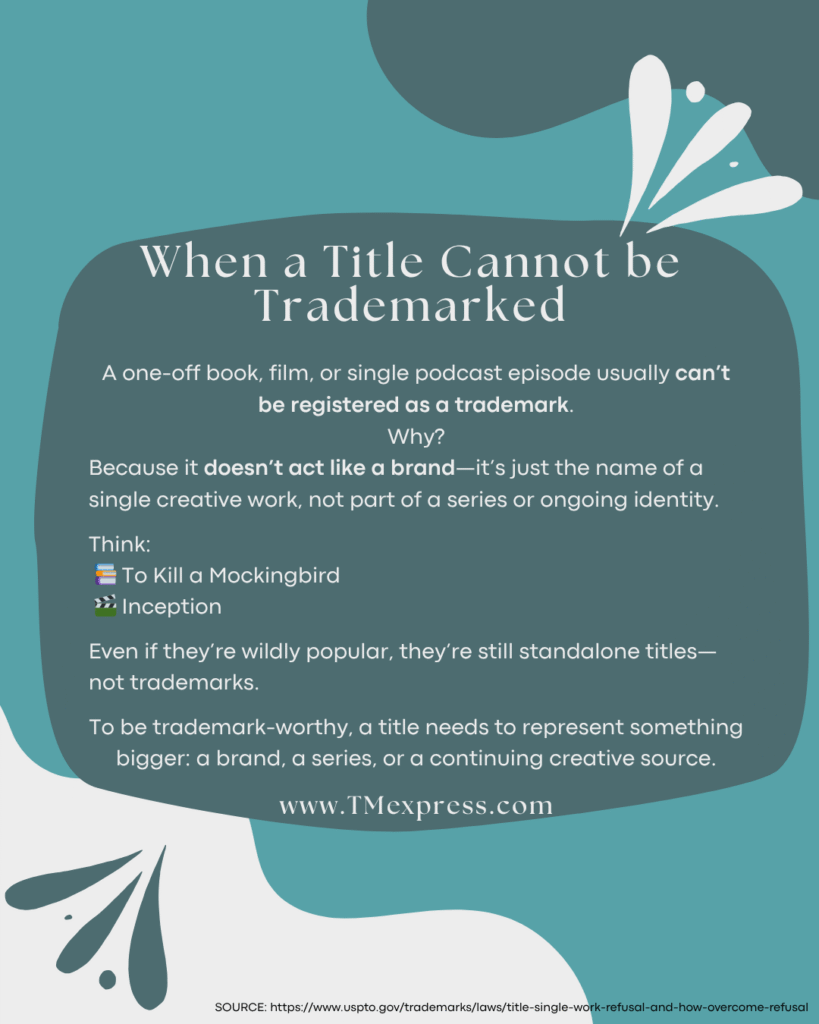When Titles Can Become Trademarks
If you’ve written a book, produced a film, launched a podcast, or created any kind of content, you might be wondering: Can I trademark the title? It’s a great question—and the answer depends on whether you’re dealing with a one-off project or an ongoing series.
The short version? Titles of single creative works generally can’t be trademarked. But if your title is used across a series, then you may be eligible for protection. Let’s break that down in plain language.
Why One-Off Titles Usually Aren’t Eligible
The U.S. Patent and Trademark Office (USPTO) won’t approve a trademark application for the title of a standalone creative work. Why? Because a single book or film title doesn’t function as a source identifier—it doesn’t signal to the public that the title comes from a particular producer or brand. It’s just the name of one creative product.

Take To Kill a Mockingbird by Harper Lee or the film Inception. Both are standalone works. Their titles don’t indicate an ongoing series or brand, so they don’t qualify as trademarks.
This rule applies no matter how popular the work is. Even if it’s released in multiple formats—like print and eBook—or translated into different languages, it’s still considered a single work as long as the content doesn’t change in any meaningful way.
This rule also applies to a book that’s divided into chapters or a play that’s performed live. If there’s no significant variation in the content across versions, the USPTO still views it as one work—not a series.
When Titles Can Be Trademarked
Now let’s talk about when trademark protection is possible. If your title is used across multiple works—meaning it refers to a series rather than a single piece—it may function as a trademark. That’s because a recurring title begins to act as a brand name, pointing consumers to a reliable source of content.

Specifically, a series consists of multiple creative works where the content evolves or changes with each entry. That change can take many forms: a new issue of a magazine, an updated edition of a guidebook, a new season of a TV show, or a sequel in a film franchise. Each installment adds something new or different.
The same goes for educational materials that are refreshed periodically, coloring or activity books with varied content, or software that’s updated over time. These kinds of recurring creative works are exactly what the USPTO looks for when approving a title as a trademark.
For instance, Harry Potter is the name of a book series, Star Wars spans multiple films, and This American Life refers to an ongoing radio program. These are not one-time creative efforts—they’re brands that live across multiple entries. That’s what makes them eligible for trademark protection.
To succeed in registering a title like this, you’ll need to show that your mark applies to a series of works, not just one.
What About Repeating Title Elements?
Sometimes, the same phrase appears in the title of more than one work—but it’s only part of the full title. This happens a lot in children’s books, film franchises, or educational series.
To qualify for trademark protection in cases like this, the repeating part must do more than just appear in multiple titles. It has to create a distinct commercial impression—meaning it stands out clearly from the rest of the title and functions like a brand name. It also needs to be recognized and promoted as identifying the series, not just used casually in a few titles.
Take Dog Man, for example. It appears in titles like Dog Man: Fetch-22 and Dog Man: Twenty Thousand Fleas Under the Sea. In this case, “Dog Man” isn’t just the title—it’s a repeating portion.

Proving Your Title Qualifies
To successfully register a title or recurring title element as a trademark, you’ll need to provide clear evidence that it’s being used across a genuine series. This could include screenshots of different book covers, point-of-sale listings, advertising materials, or screen captures from streaming platforms or download sites.
You may also need to show that the repeated title portion creates a separate brand impression apart from the full title. Marketing campaigns, consumer reviews, or retailer references that call out the title portion as the name of a series can all help strengthen your case.

For example, if your marketing says “Explore the Little Engine series” and that phrase shows up consistently in advertising and reviews, the USPTO is more likely to recognize the title portion as a trademark.
Trademark Research Matters More Than Ever
Even if your title meets all the requirements above, you still need to clear a big hurdle: availability. Just because your mark looks eligible on paper doesn’t mean someone else hasn’t already registered something confusingly similar.
That’s why a comprehensive trademark search is essential. This isn’t just a quick check of the USPTO database. A true clearance search digs deeper—examining pending or registered federal trademarks, state trademark records, unregistered common law uses, domain names, social media handles, and even lookalike or soundalike names that could create legal trouble.

This is especially critical for series titles. If you plan to build a long-term brand around your content, you want to be confident it’s safe to move forward without risking conflict, rebranding, or infringement issues.
Ready to Protect Your Title? We Can Help.
At TradeMark Express, we help creators, authors, and business owners safeguard their titles and creative brands—whether they’re books, podcasts, film series, or educational content. Our comprehensive trademark research service is designed to identify risks early, before you invest time and money promoting your title.
If your work qualifies as a series, we’ll help you gather the right evidence and avoid common pitfalls. And if it doesn’t, we’ll explain why—so you can make an informed decision.
Protect your creative brand the smart way.
Contact TradeMark Express to get started with a comprehensive trademark search today.

Pingback: How to Trademark a Book